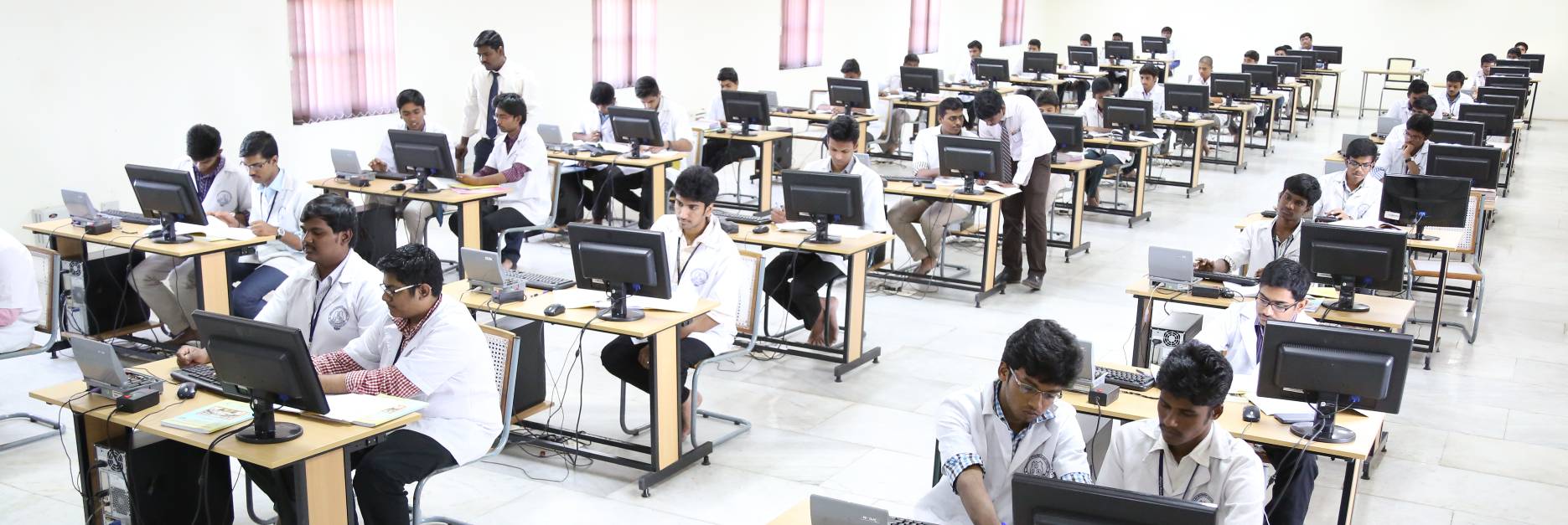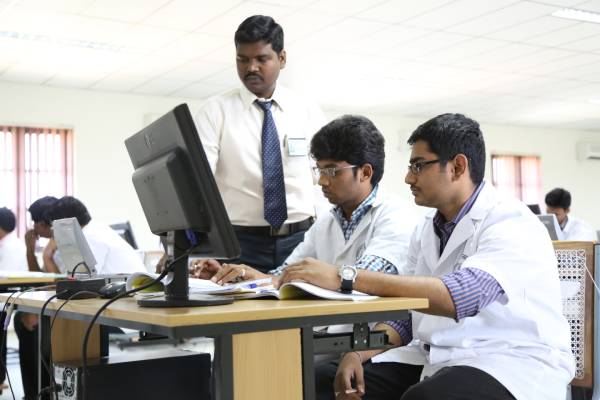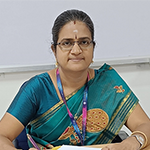
About the Department
Vision and Mission
PEO,PO’S,PSO’S
HOD Profile
Faculty List
Milestones
Professional Society
Clubs
Events
Newsletter & Magazines
Survey Forms
Course Module
Department Library
About the Department
B.Tech – Computer Science and Business Systems (CSBS) programme, established in the year 2020, to address the growing needs of engineering talent with skills in digital technology. This curriculum strives to impart students with core topics of Computer Science with a blend of humanities and management science, thus making them aligned to Industrial Revolution 4.0
This program exposes the students to emerging topics such as Analytics, Machine Learning, Cloud Computing, Internet of Things, etc. and makes them “Industry Ready”. This curriculum is a “One Stop Solution” for the growing demand in the corporate world.

This curriculum aims to enhance the following key attributes among students:
- Understanding of Technology Abstraction
- Knowledge of Common Business Principles
- Innovation Ability
- Understanding of Contemporary Technology
- Business Discipline and Service Orientation
- Strong in Ethics and Life Values
Vision and Mission

VISION
To envision the technology and business trends in teaching, research and service that advances the economic strength of our nation, contribute significantly towards being a center of excellence in providing globally standard education that responds swiftly to the challenges of the ever changing world.
MISSION
- M1: To produce graduates as unique individuals equipped with quality and depth of information in the diverse fields of Computer Science empowered by inspiring intellectual curiosity, critical thinking and creativity.
- M2: To generate new knowledge by engaging in cutting-edge research in alliances with industry and research organizations.
- M3: To inculcate moral values and ethical responsibilities among students throughout reach programs.
Programme Educational objectives (PEOs):
Programme Outcomes (PO)
Programme Specific Outcomes (PSO)
HOD Profile

Dr. D.Anuradha M.E., PGDBA(Finance), Ph.D.
Head of Department, Department of Computer Science and Business Systems
Professor and Head of the Department of Computer Science and Business Systems has a rich experience in the field of Computer Science and 20+ years of teaching experience. She received her Bachelor’s degree in Computer Science & Engineering from the University of Madras. Then she obtained her Master’s degree in Computer Science from Sathyabama University, Post Graduate Diploma in Business Administration from Symbiosis and Doctorate Degree in the field of Wireless Sensor Networks from Sathyabama Institute of Science and Technology.
Her specializations include Wireless networks and Network Security. Her field of interest includes Computer Networks, Deep Learning, Compiler Design, and Data structures. She has published more than 20 research articles in various reputed journals.
Research Credentials
h-index(Scopus): 6
Google Scholar ID:
https://scholar.google.com/citations?user=VJIDw4UAAAAJ&hl=en
Scopus ID: :
https://www.scopus.com/57201032747
Orchid ID:
https://orcid.org/0000-0001-7357-0715
Faculty List
| S.No. | Name of the Faculty | Designation |
| 1 | Dr.D.ANURADHA |
Professor & Head |
| 2 | Dr.S.SELVAKUMAR |
Professor |
| 3 | Dr.A.SWAMINATHAN |
Professor |
| 4 | Dr.K.NAGALAKSHMI |
Associate Professor |
| 5 | Mrs.R.JANANI |
Assistant Professor |
| 6 | Mrs.K.SUPRIYA |
Assistant Professor |
| 7 | Mrs.S.RAHINI SUDHA |
Assistant Professor |
| 8 | Mrs.M.PAVITHRA |
Assistant Professor |
| 9 | Mrs. R.VANIDHASRI |
Assistant Professor |
| 10 | Mr.S.JAYABALAN |
Assistant Professor |
| 11 | Mrs. D.K.GERIYAASHAKTHI |
Assistant Professor |
| 12 | Mrs.D.YAMINI |
Assistant Professor |
| 13 | Mrs.C.PRADEEBA |
Assistant Professor |
| 14 | Mrs.P.VIDYASRI |
Assistant Professor |
| 15 | Mrs.R.A.MABEL ROSE |
Assistant Professor |
| 16 | Mr.A.ARUN |
Assistant Professor |
| 17 | Mrs.K.BHAVANI |
Assistant Professor |
| 18 | Mrs.J.NITHYA |
Assistant Professor |
| 19 | Mrs.J.ANCY JOSE |
Assistant Professor |
| 20 | Mrs.R.SRI VIDHYA |
Assistant Professor |
| 21 | Mr.M.VENGADANATHAN |
Assistant Professor |
| 22 | Ms.R.VAISHNAVI |
Assistant Professor |
| 23 | Mr.R.DHANDAPANI |
Assistant Professor |
| 24 | Mr.T.KARTHIKEYAN |
Assistant Professor |
| 25 | MRS.M.S.KALPANA |
Assistant Professor |
| 26 | MS.S.KOUSALYA |
Assistant Professor |
| 27 | Ms.S.SHARMEELA |
Assistant Professor |
| 28 | Ms.D.SUGANTHI SHARMILA |
Assistant Professor |
| 29 | Mr.P.JEBASTIN DAVID RAJ |
Assistant Professor |
| 30 | Mrs.ABIRAMA SUNDARI |
Assistant Professor |
| 31 | Mrs.SHAMINI |
Assistant Professor |
| 32 | Mrs.S.RANJITHA |
Assistant Professor |
| 33 | Mrs.R.LAKSHMI |
Assistant Professor |
| 34 | Mrs.A.ABISHA |
Assistant Professor |
| 35 | Mr.D.KAMALA KANNAN |
Assistant Professor |
| 36 | Mr.M.PRABHAKARAN |
Assistant Professor |
Milestones
-
2020Programme started with the intake of 60 students
-
2021Programme intake increased to 120 students
-
2022Programme intake increased to 240 students
-
2023MoU signed with Tata Consultancy Services for 5 years (Curriculum designed with the support from TCS)
Professional Society
Survey Forms
Question Bank – Academic Year 2025-26 (Odd Semester)
| YR/SEM | SUBJECT CODE | SUBJECT TITLE | LINKS |
| II Yr / IV Sem | 23CB1301 | Object Oriented Programming | |
| 23CB1302 | Formal Language and Automata Theory | ||
| 23MA1305 | Computational Statistics | ||
| 23CB1303 | Software Engineering | ||
| 23CB1304 | Computer Organization and Architecture | ||
| III Yr / VI Sem | 23CB1501 | Design and Analysis of Computer Algorithms |
|
| 23CB1502 | Computer Networks | ||
| 23CB1503 | Fundamentals of Management | ||
| 23CB1504 | Java Programming | ||
| 23CB1907 | Business Strategy Management | ||
| 23CS1910 | Digital Marketing | ||
| 23EC1011 | Telehealth Technology | ||
| IV Yr / VIII Sem | 21CB1701 | Introduction to Innovation, IP Management and Entrepreneurship | |
| 21CB1702 | Information Security and Management | ||
| 21IT1502 | Web Technologies | ||
| 21IT1902 | APP Development | ||
| 21IT1915 | Cyber Security |

CSBS Department Library Details
| Item | Details |
| Area | 70 Sq.m. |
| No. of Volumes | 769 |
| No. of Titles | 256 |
| No. of Total Technical Journals(Scopus-National) | 17 (Access to Central Library-I) |
| No. of Reprint(Internationals Journals) | 07 (Access to Central Library-I) |
| No.of Computers | 02 |
| No. of E-Journals | 05(IEEE-ASPP/IEEE-POP/ELSIVIER-SCOPUS/ DELNET/EBSCOHOST |
| No. of E-Books | 01 (MGH) |

E-Resources(E-journals / E-Books)
Click Here

Remote Access Resources
Click
Here







